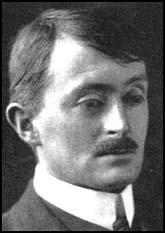John Masefield

John Masefield was born in Ledbury in 1878. At the age of sixteen Masefield entered the merchant navy. A year later, after completing a Atlantic voyage, he deserted ship and became a vagrant in America.
Masefield returned to England in 1897 where he found work as a journalist. For a while he worked under Charles Masterman, the literary editor of the Daily Chronicle. Masefield's first published book was Salt Water Ballads (1902). After joining the Manchester Guardian in 1907, Masefield continued to write poetry and 1910 saw the publication of his collected work Ballads and Poems. This was followed by The Everlasting Mercy (1911) and The Widow in the Bye Street (1912).
Soon after the outbreak of the First World War, Masefield joined the Red Cross and served in France and then went on the Dardanelles expedition with an ambulance unit and witnessed the Gallipoli disaster. When Masefield returned to England, he was recruited by Charles Masterman, the head of Britain's War Propaganda Bureau (WPB).
The WPB sent Masefield to America to give lectures on how Britain was winning the war. On his return, Masefield reported to Charles Masterman that he had been heckled at meetings when talking about the Dardanelles campaign. Masterman asked Masefield to write a pamphlet the counter the image in America that the British had been defeated at Gallipoli. In his pamphlet, Gallipoli, published in 1916, Masefield attempted to show the glory of the campaign.
In 1917 Masefield wrote another pamphlet, The Old Front Line, for the War Propaganda Bureau. In the pamphlet Masefield described German retreats on the Western Front and provided a considerable number of stories of heroic deeds performed by members of the British Army.
Masefield's Collected Poems (1923) sold in great numbers, as did the novels Sard Harker (1924) and Odtaa (1926). In 1930 Masefield became poet laureate. He produced more volumes of poetry, two novels about the sea, Dead Ned (1938) and Live and Kicking (1939) and two volumes of autobiography, So Long to Learn (1952) and Grace Before Ploughing (1966). John Masefield died in 1967.
Primary Sources
(1) John Masefield, Gallipoli (1916)
No such gathering of fine ships has ever been seen upon this earth, and the beauty and the exultation of the youth upon them made them seem like sacred things as they moved away. All that they felt was a gladness of exultation that their young courage was to be used. They went like Kings in a pageant to their imminent death.
The campaign came, more than once, very near to triumph, achieved the impossible many times, and failed, in the end from something which had nothing to do with arms nor with the men who bore them.
